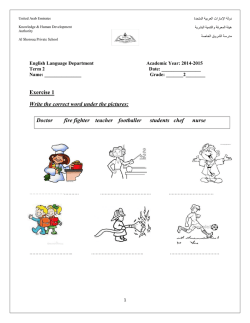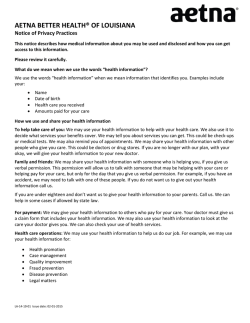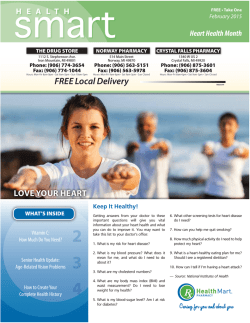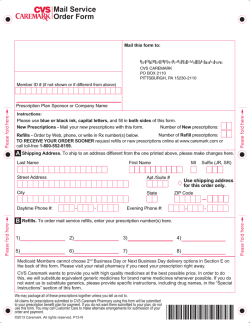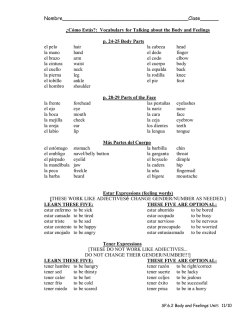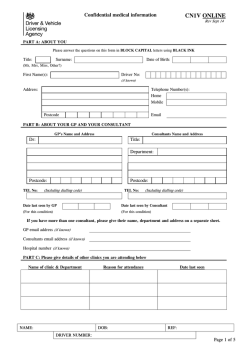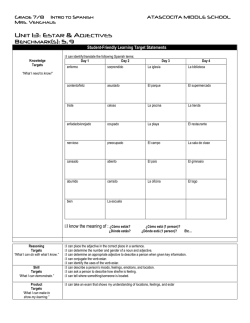
How to Go to A Walk-In Clinic or Doctor
How to Go to A Walk-In Clinic or Doctor If you have a medical emergency in the United States, call 911 or go to a hospital emergency room (ER). The ER may have a very long wait. If your medical problem is less serious, go to a walk-in clinic. Look online or in a phonebook for the closest clinic. Use the search “walk-in clinic” plus the name of the city you are in. In a phonebook, look under “doctor” or “medical.” Check the clinic hours. You don’t need an appointment at most clinics. You might want to bring a dictionary or a friend who can translate. Documents to bring If you are a visitor, you will probably be billed for your visit. Bring your papers with you, if you have insurance, and your ID. If you are a student, bring your permit. Do you need to have your prescription refilled? Bring your prescription form or bottle of medication with you. Reception Visit the reception desk first. The receptionist will ask you for your name and health card. Tell the receptionist you are an insured visitor or an uninsured visitor. If you are a student, who her your student permit. The receptionist may ask you to fill out a form. She may ask you a few questions: Do you have a family doctor/GP? (You can tell her your doctor’s name in your country.) Why do you need to see a doctor today? What is your medical concern? How long have you had this problem/these symptoms? Are you taking any medication? Do you have any allergies? Waiting Times Most walk-in clinics will not tell you how long you will have to wait. They may estimate the time for you. Usually you wait in a waiting room until your name is called. Listen carefully. Then you go into an examining room and wait for the nurse to talk with you before the doctor sees you. You can try to ask these questions: How long is the wait? How many doctors are on duty? Talking to the Doctor When the doctor comes, he or she will look at the information from the receptionist or nurse. The doctor will ask you the reason for your visit: What brought you in today? What’s your medical concern? How can I help you? Do your best to explain your (or your child’s) symptoms. Use gestures to point at body parts if you can’t explain something. Here are some typical symptoms: I have a sore throat. (She has a sore throat.) I have an earache. I have an infection. I have a bad cough. I have a rash. I feel sick to my stomach. I have a stomach ache. I think I have the stomach flu. I think I have food poisoning. I have been vomiting/throwing up since yesterday. I have a fever. (high temperature) I have chills. I’m experiencing pain in/on my (body part). I fell and hurt my (body part). I have a bad headache. My is swollen. I think I am pregnant. The doctor will ask how long this has been a problem: How long have you had these symptoms? Have you had this before? Are you in a lot of pain? Are you experiencing a lot of discomfort? You can answer in two ways: for… …amount of time: for five days; for about a week since… …day or time it started in the past: since last Tuesday; since this morning The doctor will examine you. The doctor may ask you to remove or loosen your clothing. The doctor will make a suggestion or offer you a prescription. If you don’t understand, ask the doctor to repeat. Ask the doctor if he or she needs to see you again. Here are a few ways you can ask the doctor if he/she needs to see you again: I’m sorry, Doctor. I don’t understand what you said. Should I come in again? When should I come back? Pharmacy If you require medication, the doctor will write you a prescription. You will have to go to a pharmacy to get your prescription filled. Another word for pharmacy is drugstore. Ask the doctor to write down the address of the closest pharmacy. The person at the pharmacy is the pharmacist. Make sure you understand the dosage. If you are unclear about the dosage, ask the pharmacist to repeat the information. Can you explain that to me again? Repeat the dosage back to the pharmacist to be sure that you understand. Quizlet: Basic Terms for an Office Visit to the Doctor Bien Well La gotas Drops Cabeza Head La inyección Shot Casado Tired La medicina Medicine Débil Weak La operación Operation Diagnosticar To diagnose La pastille Tablet Digerir To digest La pildora Pill Doler(le) To hurt La presión (arterial) Blood pressure El análisis de sangre Blood test La receta Prescription El antibiótic Antibiotic La tos Cough El bulto Lump La venda Bandage El calmante Sedative La vitamina Vitamin El dolor de ________ ________ache, pain Las curas Ures El electrocardiógrafo Electrocardiogram Las dogas Drugs El escalofríos Chills Las muletas Crutches El estornudo Sneeze Las sintomas Symptoms el examen fisico Physical examination Los calambres Cramps El mal aliento Bad breath Mal Badly El médico Doctor Operar To operate Régimen Diet Para los oidos Ear El supositorio Suppository Para los a jos Eye El/la paciente Patient Perder el conocimiento To lose consciousness Enfermo Sick Recuperar To recuperate Esornudar To sneeze Sentirse To feel Espalda Back Sufir To suffer Estar dieta To be on a diet Tener la diarrhea To have diarrhea Estar embarzada To be pregnant Tomar(le) el pulse To take someone’s pulse Estar estreñido To be constipated Trgar To swallow Estar sin aliento To be out of breth Vacunar To vaccinate Estómago Stomach Fuerte Strong Hinchado Swollen Hinchar To swell La aspirina Aspirin La cirguía Surgery La cita Appointment La comezón Itch La enfermera Nurse La giebre fever Quizlet: Doctor Visit Acabar de Caer Cortar Curar El catarro El doctor Enfermar Estar enfermo Estar saludable Estar sano Evitar La doctora La refriado Lastimar Mejorar Occurrir Quemar Romper Ser alérgico a Tener alergia a Tener catarro Tener dolor de Tener la gripe Tener un resfriado Tener un virus Tener una infección Toser Trartar de Vendar To have just finished To fall down To cut (oneself) To cure; to be cured Cold Male doctor To get sick To be sick To be healthy To be healthy To avoid Female doctor Cold To get hurt To improve; to get better To occur To burn; to get burned To break To be allergic to To be allergic to To have a cold To have a …pain To have the flu To have a cold To have a virus To have an infection To cough To try to To bandage (oneself); to dress a wound
© Copyright 2026

